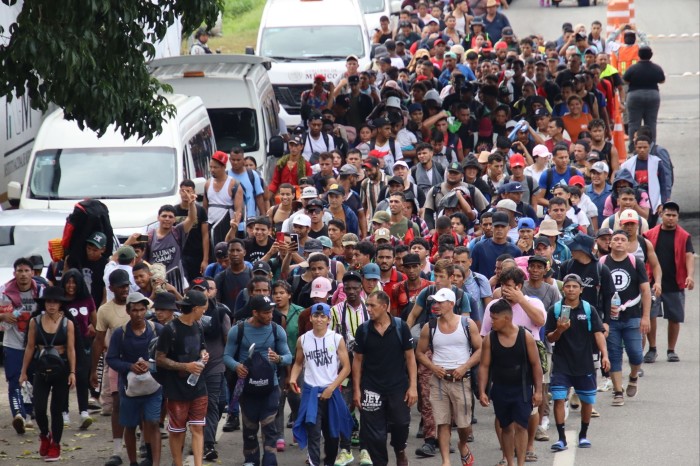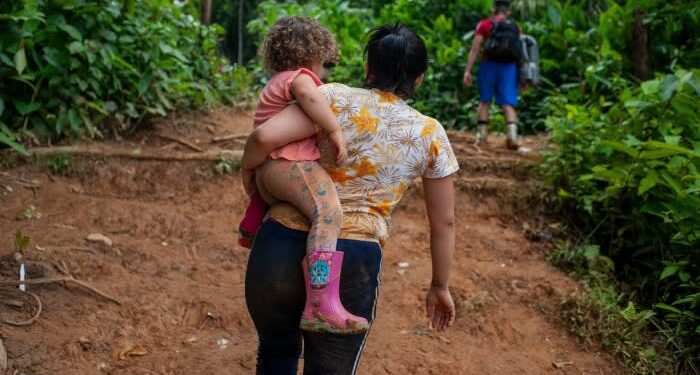The economy, which shrank by three-quarters in the eight years up to 2021 before recovering slightly, is creaking as the gap between the official and black market exchange rates has expanded by more than 20 per cent since the election. Annual inflation hit 46 per cent in September, according to the Venezuelan finance observatory think-tank.
ŌĆ£I would have loved to live in Venezuela my whole life, but thatŌĆÖs not an option now and I donŌĆÖt know what comes next,ŌĆØ said Alfredo, who fled in August. He crossed into Colombia and is en route to the Dari├®n Gap.
A survey by Venezuelan pollster Poder y Estrategia last month found that 26 per cent of respondents were intending to migrate, with 6 per cent already having made concrete plans to do so.
This does not mean they would appear at the US border soon, analysts said. From the Dari├®n, migrants travel more than 2,000km through several Central American countries and into Mexico.
MexicoŌĆÖs government has stepped up immigration enforcement this year, and the Biden administration has changed the rules to make it very hard to request asylum without an appointment.
The vast majority of Venezuelans now wait months in Mexico for an appointment, creating a backlog of migrants sleeping on streets, in shelters and low-income housing across the country.
ŌĆ£That differential between new arrivals in Mexico and those who canŌĆÖt actually leave Mexico is going to keep growing,ŌĆØ Isacson said.
 Migrants walk in a ŌĆścaravanŌĆÖ from MexicoŌĆÖs southern border town of Tapachula last week ┬® Juan Manuel Blanco/EPA/Shutterstock
Migrants walk in a ŌĆścaravanŌĆÖ from MexicoŌĆÖs southern border town of Tapachula last week ┬® Juan Manuel Blanco/EPA/Shutterstock
The tougher measures might dissuade some, but migrant numbers were expected to rise before and immediately after the US election, said Ariel Ruiz Soto, senior policy analyst at the Migration Policy Institute.
ŌĆ£Smugglers and other bad actors take advantage of the moment to say, ŌĆśthis is the time you have to goŌĆÖ,ŌĆØ he said.
The US has pushed for stricter migration enforcement in Mexico and Central America. But its policy on Venezuela has been more erratic.
A year ago the Biden administration ŌĆö concerned by migrant outflows ŌĆö hoped to secure democratic reforms from Maduro by allowing temporary sanctions relief on VenezuelaŌĆÖs critical oil sector. But it reimposed them in April after Caracas banned the oppositionŌĆÖs main presidential candidate.
For Karina S├Īnchez, a 27-year-old manicurist who is saving money in Colombia for the onward journey to the US, the only certainty is that she cannot return to her home country.
ŌĆ£I must make it work because I want a future for me and the two children I left in Venezuela.ŌĆØ
Additional Reporting by Ana Rodr├Łguez Braz├│n in Caracas. Data visualisation by Keith Fray
Source link : http://www.bing.com/news/apiclick.aspx?ref=FexRss&aid=&tid=671dd8767be940b194b2810f19ee2e98&url=https%3A%2F%2Fwww.ft.com%2Fcontent%2F866f7c21-c5c4-436b-89f4-31b09c2d7a2c&c=16901349745747227598&mkt=en-us
Author :
Publish date : 2024-10-26 18:00:00
Copyright for syndicated content belongs to the linked Source.












